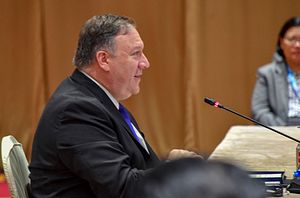U.S. Secretary of State Mike Pompeo, in Singapore, where U.S. President Donald J. Trump met Kim Jong Un for a summit less than two months ago, let slip the notion that not all is going according to plan as far as Pyongyang’s denuclearization is concerned.
“Chairman Kim made a commitment to denuclearize,” Pompeo told reporters in Singapore. “The world demanded that they do so in the U.N. Security Council resolutions.”
“To the extent they are behaving in a manner inconsistent with that, they are a) in violation of one or both the U.N. Security Council resolutions and b) we can see we still have a ways to go to achieve the ultimate outcome we’re looking for.”
Pompeo made the remarks at the ASEAN Regional Forum.
Pompeo technically stopped short of accusing North Korea of reneging or implementing the Singapore declaration Kim and Trump signed in bad faith — that’s because North Korea isn’t doing that.
His comments in Singapore follow a series of U.S. intelligence-sourced reports on everything from continuing production of fissile material, ballistic missile launchers, and intercontinental-range ballistic missiles.
In Singapore, Kim pledged to “work toward the complete denuclearization of the Korean Peninsula.” Pompeo, however, had repeatedly insisted that Kim had agreed to the “final, fully verified denuclearization of North Korea.”
The differences between these two phrases matter; the language in the Singapore agreement is intentionally vague enough to allow North Korea sufficient space to carry on with the development of its nuclear program while endeavoring to work toward global nuclear disarmament or bilateral reductions with the United States.
Pompeo is right, however, that North Korea’s ongoing ballistic missile and fissile material development violates consecutive United Nations Security Council resolutions beginning with resolution 1718 in 2006.
Since resolution 1718 in 2006, the Security Council has called on North Korea to “suspend all activities related to its ballistic missile programme” and “abandon all nuclear weapons and existing nuclear programmes in a complete, verifiable and irreversible manner.”
When Pompeo referred to the “outcome we’re looking for” in Singapore there can be little doubt that he still likely means North Korea’s “final, fully verified denuclearization.” Whatever the Singapore declaration might say, that continues to be the U.S. objective.
That’s part of the reason why the secretary of state’s early-July trip to Pyongyang to see through the implementation of the Singapore declaration fell short, with North Korea calling that round of talks “regrettable.”
North Korea’s Foreign Ministry, in a statement, took aim at Pompeo’s “gangster-like demands for denuclearization just calling for CVID, declaration, and verification, all of which run counter to the spirit of the Singapore summit meeting and talks.”
The underlining message was clear from Pyongyang: unilateral disarmament is not on the menu.

































